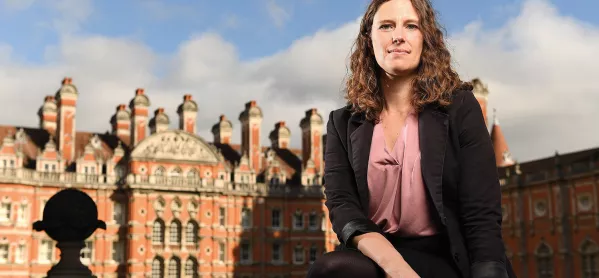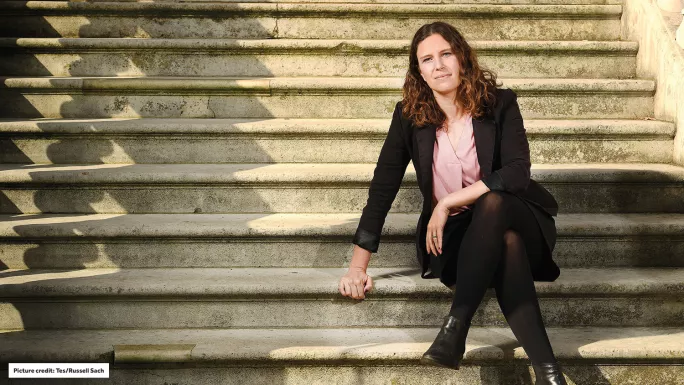- Home
- Tes talks to... Dr Jessie Ricketts
Tes talks to... Dr Jessie Ricketts

Our primary reading curriculum is heralded internationally as being outstanding - and yet 10 to 20 per cent of secondary pupils cannot read well enough to access the curriculum,” states Dr Jessie Ricketts, director of the Language and Reading Acquisition (LARA) research lab at Royal Holloway, University of London.
That may sound like a criticism of primary teachers, but she stresses that is not the case.
“There is an expectation that at the end of primary school, pupils will be able to read well and an assumption that teaching pupils to read is the job of primary teachers,” she explains. “Primary teachers are clearly doing a fantastic job - look at performance on the phonics screening check, for example - but, nonetheless, there are some pupils who, despite being exposed to excellent teaching, continue to struggle with reading.
That support will be welcomed by primary teachers, who often get scapegoated by secondary teachers for a student’s poor reading ability, but where should the blame lie?
“Well, there are likely to be many explanations. For example, in some children reading difficulties will be due to underlying language difficulties, or reflect a lack of reading experience.”
The impact on the education outcomes of these struggling students is stark, she adds.
“My research shows that vocabulary and reading abilities vary enormously in secondary pupils - from some who can read very few, if any, words at all to others reading with comprehension at adult levels,” she explains. “This variation poses enormous challenges to accessing the curriculum. Adolescent poor readers have been trying and failing to read successfully for many years, which likely has implications for self-esteem and engagement with education.”
The solution to this issue is complex, she says: the current evidence is patchy when it comes to the best way to support struggling readers in secondary schools. But her work at the LARA lab does offer some insight into one way in which primary and secondary teaching can be optimised to help these persistently struggling readers.
“I cannot underline the importance of oral language for reading enough,” she explains. “In my view it doesn’t make sense to think about one without the other and this is at the core of our work at the LARA lab,” she says.
More research required
As you might imagine, oral vocabulary - what an individual knows about words that are spoken - is particularly important for comprehension. You can’t understand what you’re reading unless you understand the words that are making it up - but Ricketts thinks that spoken language is also likely to play a part in children’s ability to decode the words they read in the first place.
“Oral vocabulary drives reading comprehension but I’ve also been interested in understanding how vocabulary knowledge is important for the reading of words,” she explains. “This area of research is not as well established, but there is evidence that oral vocabulary, as well as phonology, supports word reading.
“Let’s imagine that a five-year-old child is trying to read the word ‘friend’. If they sound out each letter on the basis of knowledge of how these letters are usually pronounced, they will end up with something like ‘free-end’ or ‘fry-end’. Now that is not quite correct but it is a pretty good partial decoding attempt. If our reader realises that ‘free-end’ is not a word that they know but they do know the very similar word ‘friend’ then they can use this knowledge to arrive at an accurate pronunciation.”
Pleasingly, there’s a certain amount of karmic justice at work here too, because while vocabulary might play an important part in children learning to read in the first place, once they actually are reading, this debt to spoken language is likely to be repaid.
“Once children learn to read, reading abilities impact on vocabulary and the relationship becomes reciprocal,” says Ricketts. “We are still working out the precise nature of this reciprocity as part of my Vocabulary and Reading in Secondary Schools (VaRiSS) project, following 200 pupils through key stage 3. But, so far, there seems to be a close relationship between oral vocabulary and reading in late childhood/early adolescence and it seems to get closer as children move through the school system.”

The reason for this at first seems relatively straightforward. “Once children can read, reading provides opportunities for vocabulary learning,” says Ricketts. “If a child encounters a new word in text, they can use the context and their knowledge to infer the meaning of a word. We know that children can do this and it seems to be an important driver of vocabulary growth, at least in the primary years.
“But I am also interested in another way that reading may promote vocabulary knowledge. I find it really difficult to learn new names - especially unfamiliar ones - unless I have seen them written down. In my experiences of being in schools, I’ve noticed that teachers often write words on the board when they are describing them.
“There’s long-standing evidence showing that presenting children and adults with visual word forms helps them to learn new spoken-word forms. I’ve gone on to show in a number of studies - along with colleagues - that children are more likely to learn the meanings of new words, if these words are taught with the visual form available.”
This is one way then that teachers can give their pupils a headstart when it comes to extending their spoken language, but what else should we be doing?
“Explicit teaching of vocabulary is really important and is typically more effective than when children learn vocabulary incidentally by listening to spoken language or reading,” explains Ricketts. “We should aim for a combination of this and equipping pupils with the skills to learn new words independently.
“Also, there is an important distinction to be made between subject-specific vocabulary and vocabulary that operates across the curriculum. Both are important - pupils need to know words like photosynthesis but also words like analyse, evaluate and so on. In secondary schools, I think there can be an added challenge because subjects are taught separately by different teams. I am working with teachers to establish the words that are essential for educational success. These will, of course, vary and change but there are some words that will always be important.”
‘A very tall order’
Ricketts, though, is sympathetic to some of the more esoteric problems teachers face when it comes to vocabulary, particularly the limitations that can occur because of children’s life experiences - or lack of them.
“Children enter the school system with enormous disparities in vocabulary knowledge and it is a very tall order to expect teachers to compensate for this. I suspect trips can be really useful here when they are possible, going to the local mosque to support religious education and associated vocabulary, or being able to actively engage with the items that they are learning about in a cookery lesson,” she says.
Ricketts’ future research promises to shed more light on how we can specifically help this group of students.
“My research has also focused on whether we can harness children’s reading skills to compensate for poor oral vocabulary. I’m interested in this because there are vulnerable children out there who seem to have better word-reading abilities than you would expect, on the basis of their oral vocabulary knowledge. In new projects we are also investigating approaches to increasing the amount of reading that children do, and how we can maximise the extent to which children learn new words while they are reading.”
It’s crucial Ricketts gets this right, she stresses, as it underpins everything else.
“We know children with better language abilities go on to have better educational and socioemotional outcomes.”
Kate Townshend is a freelance writer
Keep reading for just £1 per month
You've reached your limit of free articles this month. Subscribe for £1 per month for three months and get:
- Unlimited access to all Tes magazine content
- Exclusive subscriber-only stories
- Award-winning email newsletters



